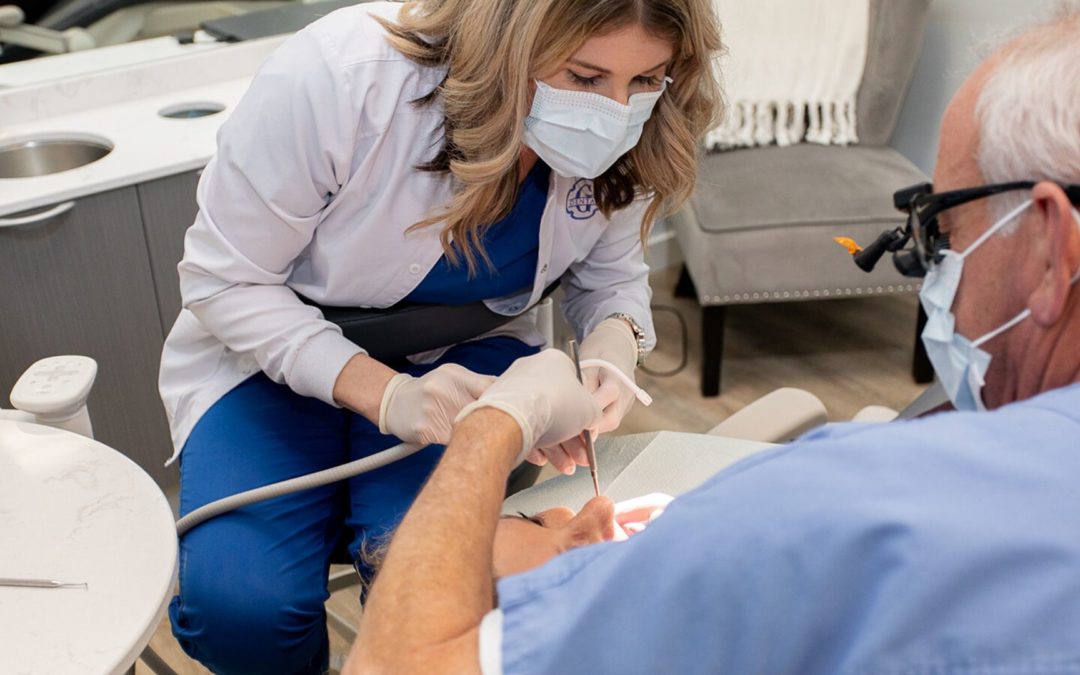According to the American Dental Association, research has estimated that there are up to 2.1 million emergency dental visits each year in the United States. Be it a sneaky toothache that makes its entry on a long holiday weekend, or an accident involving your child, dental emergencies arise more frequently than you may think! Knowing how to handle a dental emergency can make a huge difference in the outcome for all involved. In some instances, seeing a dentist within 30 minutes can be the difference in saving or losing your tooth. Ignoring a dental emergency, specifically injury to teeth or gums, can lead to more permanent damage and a much more expensive dental bill later on. It’s best to always call your local dentist immediately and take the appropriate actions.
What Qualifies as a Dental Emergency?
Dental emergencies range from a lost filling to difficulty breathing or swallowing. Knowing when to visit the Emergency Room or when to schedule an emergency dental appointment is extremely important. If you experience any of the dental situations, a trip to the hospital is in order:
-Extreme and/or sudden pain
-Severe Swelling
-Injury to the neck or head
-Bleeding that can’t be stopped
-Difficulty breathing or swallowing
Dentist offices are equipped to handle dental emergencies that are not life threatening. Some dental offices will even accommodate emergencies with after hour care. Always ask your local dentist if they have an after hour number to handle dental emergencies so you can be prepared at all times. Dental emergencies that can be handled at your dentist include:
-Loose or knocked out teeth
-Chipped or broken teeth
-Toothaches
-Lost or loose fillings or crowns
-Abscesses
-Infection
Below are some tips to help you handle some of these situations and take the proper actions to minimize or prevent damage.
Loose or knocked out tooth
When it comes to a loose or knocked out tooth, the sooner you react the better. A tooth is able to be replanted and reset within the socket only within a certain time frame and if the tooth has been properly preserved. DO NOT touch the root of the tooth and keep it from drying out. If possible, place the tooth back in the socket and head straight to the dentist. If you are unable to keep the tooth in your mouth, place it in a glass of water or milk. You can use ice or cold compress for pain and swelling. Do not ever put aspirin or any type of painkiller directly on the gums to avoid permanent damage.
Chipped or Broken Tooth
If you chip or break a tooth, preserve the pieces if at all possible. Rinse out your mouth and utilize a cold compress for pain and swelling. Call your dentist as soon as possible and get in for an emergency dental appointment so your dentist can restore your tooth.
Lost Fillings
If your filling falls out, simply store it for later use if your dentist finds it necessary. Fillings to not need to be preserved as teeth do. Rinse out your mouth and avoid any areas that cause pain or discomfort. If you are unable to get into the dentist immediately, find dental cement at a local pharmacy and fill the hole left by the filling until you are able to be seen. Avoid putting pressure on the tooth and avoid hard foods in risk of further damaging the weakened tooth.
Toothaches
If the source of the toothache is something lodged within the teeth, try using dental floss, or another object to dislodge the item. Be careful not to use anything sharp or pointed to reduce risk of further damage. If you are unsure the reason for the toothache, rinse your mouth out with warm water and use a cold compress for pain until you can get in to see the dentist. Reasons for toothaches include infections, damaged fillings, abscessed tooth, tooth decay and more and should not be ignored. Ignoring a toothache could lead to more permanent damage. Pain, when left untreated, almost always gets worse!
Accidents do happen, but taking preventative measures can save you a lot of pain from dental emergencies. Do your best to implement preventative measures such as: wearing mouthguards for sports, practicing good oral care, not opening anything with your teeth, and making regular trips to the dentist for maintenance and cleanings. Dental emergencies can be frightening and painful; At Guilliot Dental, we have a skilled staff experienced with dental emergencies and will do everything we can to help. Contact us with any questions about dental emergencies or to schedule an emergency dental appointment in Lafayette or Broussard.


Recent Comments